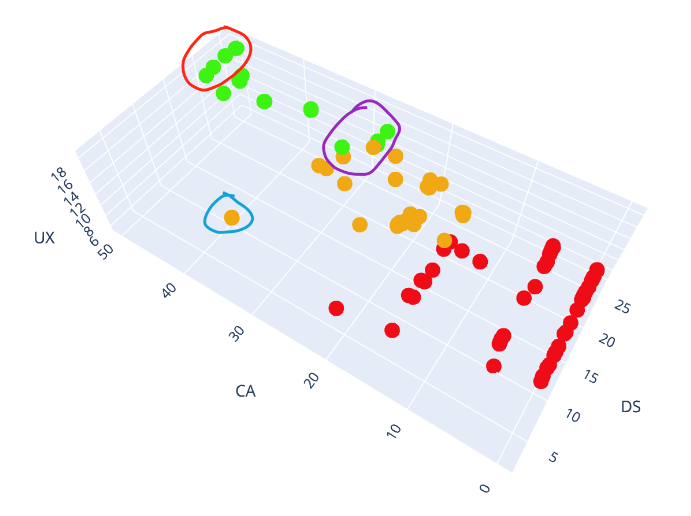The impact COVID-19 has on our mental health is expected to last beyond any physical health issues. The virus itself, as well as the measures to safeguard lives that have come with it, have led to a rise in issues that cause mental ill health, such as loneliness, stress, financial worries, stigma and bereavement. And fears of stigma, mean our key workers are still amongst the least likely to engage with traditional mental health services(1).
Mental health apps can help people experiencing anxiety, depression, self-harm, panic attacks and thinking of suicide. There is evidence to show that digital therapies can achieve comparable outcomes to face-to-face therapy(2), when the content is right and supported by a suitably trained therapist. They can be embedded into services, transforming and extending support for patients.
Health apps are convenient and discrete, easily accessed with a tap of the button. Young men and boys in particular are concerned about the stigma of receiving mental health support and say they would prefer online support, advice and counselling(3).
But, amongst the 3,857 mental health apps available in unregulated app stores(4), which ones are the best?
The Organisation for the Review of Care and Health Apps (ORCHA) has reviewed almost 600 mental health apps that help people experiencing anxiety, depression, self-harm, panic attacks, and thinking of suicide. Each app was assessed against more than 260 criteria across Clinical Assurance, Data Privacy, and User Experience.
Of these apps, only 29.6% meet quality thresholds(5); a figure that drops even lower for certain conditions, including:
- 27% for Addiction
- 26% for Suicide Prevention
- 23% for Insomnia
- 18% for eating disorders.
- 9% for Bipolar
- 5% for apps for OCD


Whilst reviewing mental health apps, the team also identified significant patient groups who do not yet appear to have apps that have been built to meet their needs. These include:
- Postnatal depression – although there are good apps to connect new mums with others, which will help mental health, there don’t appear to be any apps specifically designed to provide help with postnatal depression.
- Midlife – women are at risk of depression through the menopause and changes such as children leaving home and caring. Although there are good generalised depression apps, there don’t appear to be any for this specific need.
- Suicide – although there are apps to help people who are thinking about suicide, there don’t appear to be apps that provide support for loved ones following a suicide attempt of a family member or friend, or apps for those who have been bereaved by suicide.
ORCHA is calling for developers to get in touch if they have such a solution, or to consider building an app to meet one of these clear needs.
Apps offer a wide variety of features such as real-time monitoring, recording, and gamification, that help increase a person’s understanding and engagement with their mental health treatment. But people who download a mental health app without an assessment are putting themselves at risk.
Before recommending a mental health app, read its independent evaluation on the ORCHA App Library at: appfinder.orcha.co.uk
Sources:
1) Research relating to various groups of key workers…
For healthcare providers:
Ross C, Goldner E. Stigma, negative attitudes and discrimination towards mental illness within the nursing profession: a review of the literature. J Psychiatr Ment Health Nurs. 2009;16(6):558–567. [PubMed] [Google Scholar]
Schulze B. Stigma and mental health professionals: a review of the evidence on an intricate relationship. Int Rev Psychiatry. 2007;19(2):137–155. [PubMed] [Google Scholar]
Wallace JE. Mental health and stigma in the medical profession. Health (London). 2012;16(1):3–8. doi:10.1177/1363459310371080. [PubMed] [Google Scholar]
Adams EF, Lee AJ, Pritchard CW, et al. What stops us from healing the healers: a survey of help-seeking behavior, stigmatisation and depression within the medical profession. Int J Soc Psychiatry. 2010;56(4):359–370. [PubMed] [Google Scholar]
For teachers:
https://www.nuffieldfoundation.org/news/more-teachers-reporting-mental-health-problems-than-ever…. The findings show that around 5% of teachers in England now say that they suffer from a long-lasting mental health problem which has lasted (or is likely to last) for more than 12 months.
For police:
Stuart H. Mental Illness Stigma Expressed by Police to Police. Isr J Psychiatry Relat Sci. 2017;54(1):18-23.
Edwards AM, Kotera Y. Mental Health in the UK Police Force: a Qualitative Investigation into the Stigma with Mental Illness. International Journal of Mental Health and Addiction (2020)
2) Healthcare Conferences UK: Improving Outcomes Through Digital Psychological Therapies & Digital IAPT; NICE: Improving Access to Psychological Therapies (IAPT); Centre for Mental Health: Covid-19 and the nation’s mental health
3) YoungMinds research reports that children and young people often look for support and advice online for their mental health – young men and boys in particular have said they would prefer online support, advice and counselling – but this support is not always available.
4) Analysis of Google Play and Apple Stores, searching for ‘mental health’ matches within the title and description of apps in the fitness and medical categories.
5) Based on ORCHA assessment of a sample of 584 apps, assessing these against 260 criteria across Clinical Assurance, Data Privacy, and User Experience.




